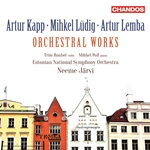MIHKEL LÜDIG
1.
Overture-Fantasy No.2 (1945)
8:47
in B minor • in h-Moll • en si mineur
Allegro moderato - [Poco più mosso] - Andante -
Tempo I - [Poco più mosso] - Andante
ARTUR LEMBA
Concerto No.1 (1905, revised 1910) *
21:59
in G major • in G-Dur • en sol majeur
for Piano and Orchestra
2.
I
Allegro moderato - Animato - Maestoso - Vivo -
10:26
Poco meno mosso - Tranquillo -
3.
II
Andante con espressione - L'istesso tempo -
4:40
4.
III
[Rondo]. Allegro crotchet = 100 - Tranquillo crotchet = 88 -
6:51
MIHKEL LÜDIG
5.
Midsummer Night (1910)
6:27
(Jaaniöö)
Symphonic Scene
Adagio misterioso - Con moto - Allegro - Adagio
6.
Overture-Fantasy No.1 (1906)
6:48
in B minor • in h-Moll • en si mineur
Moderato - Andante - Vivace - Andante - Allegro - Tempo I
ARTUR KAPP
7.
The Last Confession (1905) †
6:08
(Viimne piht)
for Piano and Organ
Orchestrated 1990s for Violin and Strings by Charles Coleman (b.1968)
Andantino - Meno mosso
Symphony No.4 'Youth Symphony' (1948)
22:54
(Noortesümfoonia)
Dedicated to the All-Union Leninist Young Communist League
(Komsomol) on its thirtieth anniversary
8.
I
Moderato - Allegro - Tempo I
6:02
9.
II
Andante con variazioni
7:01
[Tema] -
Variazione 1. Più mosso -
Variazione 2. Tempo di Menuetto. Moderato -
Variazione 3. Moderato -
Variazione 4. Tempo di Valse. Moderato
11.
IV
Allegro moderato
6:55
Solo: Triin Ruubel violin †
Solo: Mihkel Poll piano *
Orchestra: Estonian National Symphony Orchestra
Conductor: Neeme Järvi
















 My Wish List
My Wish List




